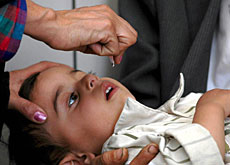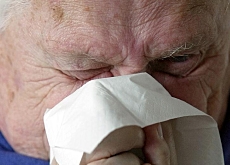New health regulations boost global response

Switzerland says the world will be better placed to deal with global health threats after this year’s World Health Assembly, which ended in Geneva on Wednesday.
Gaudenz Silberschmidt, head of international affairs at the Federal Health Office, told swissinfo that the adoption of new rules to prevent the spread of infectious diseases was a “landmark event”.
Silberschmidt was speaking at the close of the 58th World Health Assembly, which is the decision-making body of the World Health Organization (WHO).
Ahead of the two-week session, Switzerland said agreement on a new set of International Health Regulations was a priority amid growing fears of a pandemic.
The Swiss were actively involved in revising the original regulations, which date back to 1969 and were designed to help monitor and control three infectious diseases: cholera, plague and yellow fever.
The new rules include other diseases such as smallpox, polio and Sars, and state that the WHO must be informed of any disease outbreak that could constitute “a public health emergency of international concern”.
Switzerland also signed a bilateral accord on health issues with China during the assembly. It allows the exchange of information and technical cooperation in four main areas: surveillance of infectious diseases, health legislation, traditional Chinese medicine and HIV/Aids.
swissinfo: How important is the adoption of these International Health Regulations?
Gaudenz Silberschmidt: From our point of view it’s a landmark event, bringing control of acute dangers to international public health from the 20th into the 21st century. We are changing from an individual country-based system of information exchange into an orchestrated global system with universal coverage of all parts of the world.
swissinfo: You have described this as “the Kyoto protocol of international public health”. Why has it taken so long for this to happen?
G.S.: The difficulty was that it’s highly technical, legally complicated and we’re dealing with highly political issues. The mixture of all this was very complex to handle and was only possible after the experience with Sars when all countries understood that it was an absolute necessity to have this sort of common system and were ready to compromise.
swissinfo: Will the world be ready to deal with any public-health emergency of international concern once the regulations are in place in two years’ time?
G.S.: I think we can never claim to be fully ready for dangers like a flu pandemic. But we will indeed be much better prepared and much better coordinated to do as well as one can do in such a situation. But no one can claim that a crisis won’t be a crisis any more.
swissinfo: There have been new cases of avian flu in China and the WHO has reiterated concerns that the virus could jump to humans. What action was taken during the session to address fears of a flu pandemic?
G.S.: There was one specific resolution on pandemic flu and an additional one on biosafety in laboratories. The technical work has to continue regarding preparedness, such as happened in Switzerland where the government recently adopted a pandemic preparedness plan.
There has been a call, which is being followed by more and more countries, to have national plans in place that together offer better global preparedness.
swissinfo: Where else was Switzerland prominent during the assembly?
G.S.: Besides the health regulations, the other major issue as far as we were concerned was in the field of governance. On the initiative of Switzerland, there was approval of a resolution which aims to ensure that the WHO collaborates fully with other UN agencies and other global initiatives such as the Global Fund on Aids, tuberculosis and malaria at the local level.
swissinfo-interview: Adam Beaumont
The World Health Assembly meets once a year in Geneva.
It is attended by delegates from the WHO’s 192 member states.
Its main function is to determine the policies of the WHO.
The two-week assembly saw delegates approve new measures to tackle cancer, the world’s second-biggest killer.
They also discussed smallpox vaccine reserves and research on the smallpox virus.
Another resolution adopted by the assembly called on the WHO to examine the effects of alcohol abuse.

In compliance with the JTI standards
More: SWI swissinfo.ch certified by the Journalism Trust Initiative











You can find an overview of ongoing debates with our journalists here . Please join us!
If you want to start a conversation about a topic raised in this article or want to report factual errors, email us at english@swissinfo.ch.